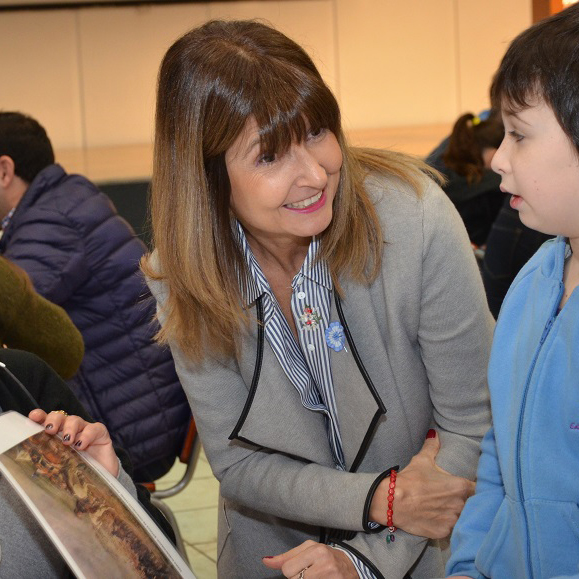“Teaching is more than imparting knowledge, it is inspiring change.”
“The art of teaching is an invitation to question and understand the world.”
“To be a teacher is a privilege, but above all, a great responsibility.”
It is said you never forget a great teacher. But while each of us has our own thoughts on what qualities are best suited to the classroom, what do the professionals themselves think?
An insight into the minds of some of the most impressive figures in the ORT global education network has been provided by the winners of this year’s Wand-Polak awards for excellent educators.
More than 10 teachers from six countries have been recognised for their years of dedication, service and ingenuity in their schools and their efforts to place the future in the hands of the next generation.
Among the programmes the ORT educators have initiated are peer-led classroom learning, audio-visual materials to support lessons, and a European Parliament-recognised Holocaust memorial scheme.
After being acknowledged for their work, the winners have each, in their own words, explained what they believe it takes to make a difference as a teacher, to change the lives of their students, and to improve the standard of education in their societies.
The Beatrice Wand-Polak Award was established by former director of ORT Latin America Bernard Wand-Polak in memory of his wife.
Beatrice Wand-Polak was a former president of the Chicago Region of Women’s American ORT (now part of ORT America). She travelled extensively on behalf of the organisation from her base in Argentina, and assisted her husband in building a network of excellent technical high schools.
The fund recognises teachers within the ORT system who have been instrumental in improving the network’s educational programmes by creating educational materials, developing new teaching methods or improving new technology.
2018 Wand-Polak Award winners:
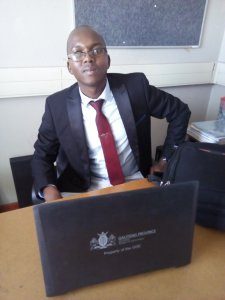
Boitumelo Moremedi of ORT South Africa
Boitumelo Moremedi – Mathematics, Physical Sciences and Geography teacher at Alexandra High School, Alexandra, Johannesburg, South Africa
The work of Boitumelo Moremedi is an inspiration to his fellow teachers. He has sought his own professional development, and used it to encourage colleagues, in a way few others achieve.
He is dedicated to urging more students to study maths – a subject at which performance in South Africa is generally poor. Of the 400 students at his school who started studying maths in grade 8, only 59 continue to take the subject in grade 11 – and all are Mr Moremedi’s pupils.
His achievements include operating an ambassador programme for pupils, using one fifth of students in a class to co-ordinate and facilitate group learning among their peers; and he has sought funding and support for extra-curricular activities as well as sourcing bursaries for students.
In his own words:
“A teacher is a compass that activates the magnets of curiosity, knowledge, and wisdom in the lives of their learners. Teaching is a tool which breeds confidence, hope and peace in our learners’ daily lives.
“Every child deserves a champion (teacher) or adult who will never give up on them, who understands the power of connection and insists that they become the best that they can possibly be. Teaching is more than imparting knowledge, it is inspiring change.
“Knowing that there are actually people who still appreciate us as teachers makes me want to be the greatest teacher to all my learners and a team player for my colleagues to share our values and teaching strategies, so that we raise a strong, economically active youth. I wish teachers would be appreciated for life, as it will change the economic status of our country.”
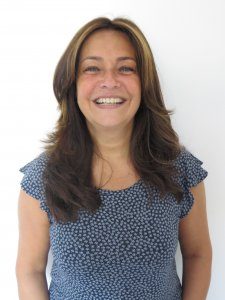
Dalia Nakache of ORT France
Dalia Nakache – teacher at Collège et Lycée ORT Robert Blum, Villiers-le-Bel, France
A Hebrew and Jewish history teacher, Dalia Nakache also creates projects and curricular programmes aimed at engaging students. One, for 16 and 17-year-old pupils, focuses on art and the Holocaust and looks at Jewish identity, the digital age, and prepares the students for a trip to Poland. Another course teaches Hebrew through the theme of life in the ghetto and the story of a woman deported to Auschwitz.
In her own words:
“Teaching is much more than a job. A teacher has always to think about the best way to interest his pupils, which is not so easy nowadays.
“New technologies have revolutionised our world and we cannot ignore them. We have to use them whenever it’s possible. It’s our challenge if we want to be in line with our pupils, for whom new technologies are an obvious fact, a teacher should be aware of the importance of his role since he prepares young people to become future adults – which is a huge responsibility.”
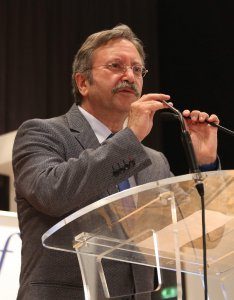
Richard Aboaf of ORT France
Richard Aboaf – teacher at Lycée ORT, Strasbourg, France
For more than 40 years, Richard Aboaf has been delivering classes for ORT Strasbourg – over 25,000 hours of them. One of his latest projects, to build a historical memorial of events at a Nazi concentration camp, brought cross-border work with French and German schools to collate the educational, technical and artistic content.
The project included several hundred students, won a European Heritage 2018 Label and was presented to the European Parliament. The exhibition and accompanying booklet was presented at local schools, town halls, museums, cultural centres on both sides of the Rhine.
In his own words:
“The art of teaching is an invitation to question and understand the world. My mission was to promote actions and projects around the memory of the Shoah.
“Receiving the Wand Polak award is great recognition.”
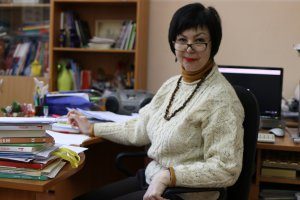
Irina Lukina of ORT Russia
Irina Lukina – teacher at ORT de Gunzburg School, St Petersburg, Russia
A recipient of numerous national teacher awards, Irina Lukina is renowned for her efforts not only in the classroom with her students, but in training and assisting her colleagues.
Focusing on innovations to develop students’ educational skills, she has gone on to share her knowledge with peers at educational forums and events and has addressed local legislators on the topic of distance learning.
In her own words:
“Teaching for me is a friendly communication, beneficial for both students and teachers. It’s a unique possibility of sharing opinions. I never miss a chance to listen to the opinions of the youngsters. Teaching young people makes me feel younger and more energetic.”
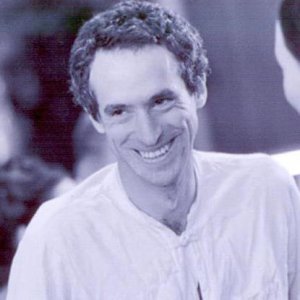
Gal Meyer of Kadima Mada
Gal Meyer – teacher at Shaar HaNegev High School, Israel
A teacher of Bible Studies and History, Gal Meyer has impressed colleagues during his two years at Shaar HaNegev by developing computer learning tools and new technological tools to make classes more productive.
His audio-visual bible studies include the construction of virtual tours of biblical sites – which use short films to develop students’ understanding of the topic and prepare them for future visits to the locations. The videos add an extra dimension to the classroom experience pupils have previously come to expect.
In his own words:
“The learner needs a challenge that matches his/her own abilities, interests, and talents.
“For me, teaching is constantly designing personal challenges for my students, while helping them acquire the skills and capabilities needed to face future challenges.
“This is not an easy task. A class consists of students with different skills, capabilities, and interests. Creating a challenge suitable for each and every student means facing an almost infinite matrix of data. Needless to say, every once in a while we fail.
“The connection points are essential when teaching humaneness and working on shaping a person who can communicate with the environment, but they need to be designed for that.”
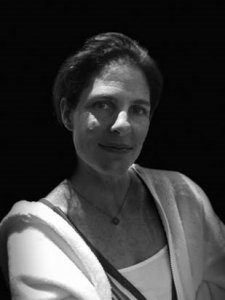
Liora Rapoport of ORT Mexico
Liora Rapoport – co-director of Project 21, Colegio Israelita de México ORT, Mexico
Described as tenacious with a high disposition to openness, problem-solving and research, Liora Rapoport has spent years dedicated to thinking about how school education can be modernised – particularly through use of technology to set a new culture in the school society.
She has spoken at international education forums and published articles in US academic journals, and shares and collaborates across the ORT network.
She develops new teaching methods and improves the effectiveness of educational technology – creating a more personalised programme for students.
In her own words:
“To be a teacher is a privilege, but above all, a great responsibility. To be a teacher is to inspire passion; to arouse curiosity for apparently trivial things. It is to bring students closer to what seems far away. It is to grow and to make discoveries with them.
“To be a teacher is to listen to your students and get their undivided attention and respect; it is to acknowledge in each and every one of them their virtues as human beings and as students, the uniqueness of each one of them. To be a teacher is to unconditionally accept every student as a good person. It is to know how to balance being exigent with being tolerant, being flexible and being patient.
“In short, to be a teacher is to bring out the best in oneself through the best of each of our students.”
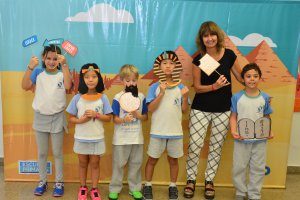
Liliana Rimer of ORT Argentina
Liliana Rimer – director of Escuela ORT Argentina Primary School
With quarter of a century of service to ORT, Liliana Rimer has been a leading figure in setting up the Learning and Solidarity Service Programme and encouraging inclusion for pupils.
In her own words:
“To educate is to boost the curiosity, the effort, the challenge, the game, the studies and the creativity in the actors of this adventure: the students.
“These active and conscious students are the ones who best develop their potential while growing autonomous with critical thinking and a collaborative attitude as well as in technical skills and abilities.”
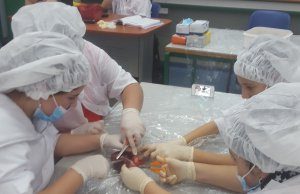
Students work on the Medicine for Beginners
Medicine for Beginners programme – Western Galilee School, Israel
This team programme tailored active learning courses to individual students. The pupils demonstrated their skills for four hours per week from the seventh grade.
A team of two teachers and two laboratory technicians developed the project, which includes courses on anatomy, physiology, healthy lifestyle and disease prevention.
Students acquired basic medical skills, visited hospitals and took part in experiments as part of the far-reaching course.

